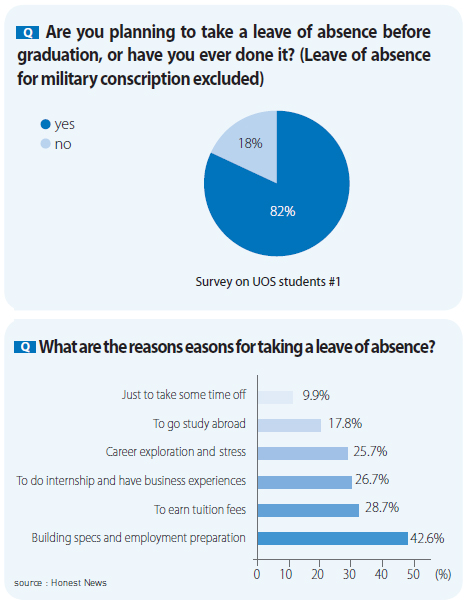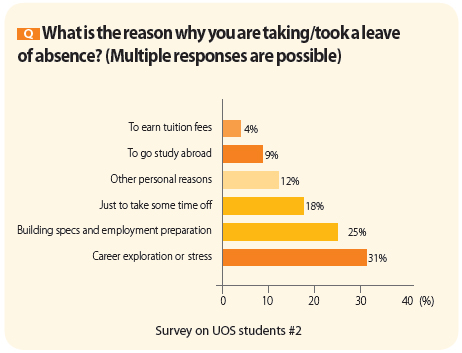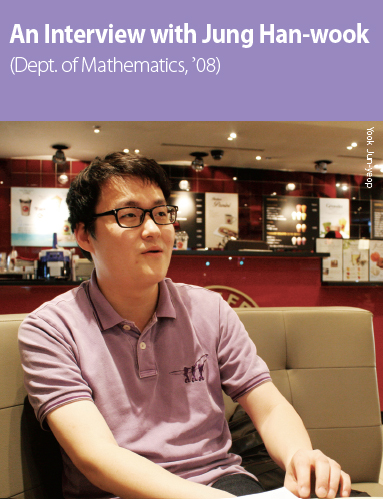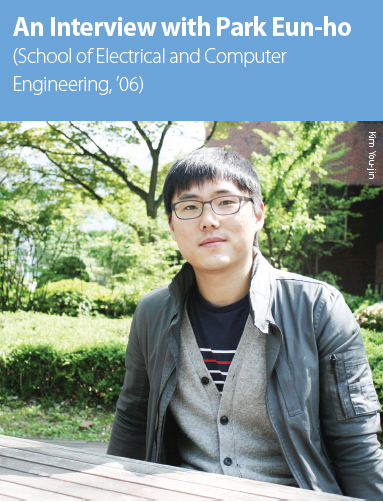It seems that for university students in Korea, taking a leave of absence has almost become a prerequisite for graduation. According to the statistics in 2012, one out of five Korean university students has temporarily suspended his or her studies on campus to go on a leave of absence. The average proportion of such students in Korean universities has been increasing each year: from 17.4 percent in 2009 to 17.8 percent in 2010 and to 19.8 percent in 2011.
What about the University of Seoul (UOS)? The UOS Times conducted a survey on the issue of a leave of absence. It turned out that UOS students are also seemingly interested in taking a leave of absence. 93 students ? 82 percent of the participants ? answered “Yes” to the question, “Are you planning to take a leave of absence before graduation or have you ever done it? (Leave of absence for military conscription excluded)”

Then, why do an increasing number of university students, including UOS students, prefer to take a leave of absence? Is it due to high tuition fees? If so, then what are the reasons that the students at UOS, where tuition fees are relatively low, take leaves of absence? In this section of The UOS Times, we covered the actual conditions of UOS students taking leaves of absence by seeking the reasons why many of them make such decisions. We will also look into specific cases of UOS students who either took or are taking a leave of absence to find out what they did or are doing during their leaves and if they are satisfied with their decisions. By doing so, we will eventually find out whether ‘the life outside campus’ is helpful, and if so, how.
According to the Statistics Korea, Korea’s ‘not economically active population’ was estimated to be 16,980,000 people as of January 2012, which turned out to be the highest rate ever. Among these people, 17 percent of the total was university graduates. In other words, many university graduates were included in this ‘not economically active population.’ This figure is not exaggerated, considering that the last year’s employment rate of university graduates stood at 59.5 percent. Besides, the number of employees in their 20s has been declining for six months in a row.
While this bad employment situation is prevailing, the number of students who have decided to take a leave of absence rather than graduate from university has now reached one million. Many of these students choose to stay in university to obtain job specs (specifications ? job criteria that are thought to be needed for employment, such as a TOEIC score). A recent survey conducted by a job search portal site, Saramin, revealed that 32.1 percent of the participants answered that they were planning to take a leave of absence this year. They selected “to earn employment specs, such as licenses” as the main reason for their answer, with a rate of 42.6 percent.

Does this also apply to UOS students? According to the above 93 students who said they already did or are going to stay out of school temporarily before they graduate, the main reason for their leaves of absence concerns ‘Career exploration or stress (31 percent),’ and ‘Building specs and employment preparation (25 percent).’ These two add up to 56 percent of the whole. This is a similar result compared with the survey results above, which showed that ‘Career exploration or stress’ and ‘Building specs and empolyment preparation’ took up 68.3 percent of all the reasons for general university students’ leaves of absence. UOS students, then, are no different from any other university students when it comes to choosing leaves of absence, in that they mostly decide to leave school temporarily due to career exploration and employment preparation as well.
Then, for what specific reasons do UOS students take leaves of absence and what kind of activities are they engaged in during their time on leaves of absence? We interviewed two UOS students to figure out whether the experiences they had during their leave helped them to prepare for their futures.

Q1 What is the reason you planned to take a leave of absence?
The main reason I took a leave of absence was to specifically decide my course after graduation. Since the banking industry, which I am interested in for employment, has various fields, I needed to choose one specific field and focus on preparing for employment in that area.
I also wanted to have various experiences. As for employment in the banking industry, you need to have real experiences in investments, so I tried to get these. I am also studying for TEPS (Test of English Proficiency developed by Seoul National University) and OPIC (Oral Proficiency Interview-Computer), which I did not have a chance to study before. Aside from those things, I wanted to do other various activities that are hard to do during the semesters as well: various off-campus activities, volunteer activities, attending general meetings of stock-holders and lecture meetings on finance.
Q2 Tell us about your daily routine as you are on a leave of absence now.
I wake up at 8 a.m. every morning and the first thing I do is checking the stock market. Every Monday, Wednesday and Friday, I do not go to an English academy, so I spend more time doing investments and analyzing the market from 2 or 3 p.m. Then I study for TEPS and work as a private tutor and as a part-timer at an academy. On Tuesdays, Thursdays and Saturdays, I have a class at an English academy at 9:30 a.m., so I spend only about an hour analyzing the market in the morning, and study English until the late evening. From 12 a.m. to 2-3 a.m., I study both domestic and foreign stock and future markets.
Q3 Do you think these activities you are doing during your time on a leave of absence will directly help you to achieve your goals?
I think they will. If I did those things during a semester, it would be difficult to put my best effort into them. Also, if I have experiences in participating and winning in mock-investment or real-investment competitions, these experiences will help me gain an advantage in competing for employment in the banking industry. Thus, overall, I think I am gaining a lot more from the one year that I will be investing in myself through the various experiences I will have.

Q1 What is the main reason that you took a leave of absence?
There are mainly two reasons why I took a leave of absence. First, I was too stressed out from taking lectures and studying for exams, so I wanted to take some time off. Also, when you become employed, there is not much time and opportunities to have your own time and enjoy what you want to do. When I was considering taking a leave of absence, I thought this would be the only time I would do what I really want to do and have diverse experiences before I find myself a job.
Q2 What did you mainly do during your leave of absence?
When I first planned my leave of absence, I was considering going to other countries through a working holiday visa. Before I took my leave, though, I wanted to learn English, so I visited the Philippines for a month to learn English and travel as well. When I had to leave after a month, I still wanted to see more things and visit more places in the Philippines. I stayed there a bit longer and got myself a job. The first job I had in the Philippines was a scuba-diving instructor. I first started my job as a clerk at the diving shop with no certificate of qualification as an instructor. Then, I eventually earned a license to become an official scuba-diving instructor. During the time I was in the Philippines, I had no concern about my studies at all and just enjoyed my life there.
I came back to Korea from the Philippines after spending about six to seven months there, and after two weeks in Korea, I flew to Canada with my working holiday visa. Having never been to Western countries, I wanted to experience Western culture, improve my English skills and further experience those things that I would not be able to enjoy once I start working at a corporation. I spent about 12 months in Canada, but I cannot confidently say that it was a successful experience since I spent most of my time working. I did not plan to go to Canada to earn money in the first place, but while I was staying there, I realized that a year is not enough time to learn English. That was why I started working instead. Back then, I had two full-time jobs.
Q3 It seems you had many diverse experiences during your leave of absence. It can be assumed, then, you also had some special experiences that you would not have had without taking a leave of absence and that you learned a lot from. What would you say to this?
In Canada, when I got my first job at a restaurant, I was engaged in doing the dishes. Although it might seem trifle, I patiently did my work and showed continuous efforts. After a while, I finally got promoted to a manager. I was in a foreign country with foreigners around me. Nonetheless, since I did my best at work, I even later the promoted to a position where I got to give orders to others and this made me very proud.
Another special experience I had was that I travelled around Canada and the United States with a car that I bought there. Through the two full-time jobs I had, I earned around $10,000 and bought myself a second-hand car. Starting in Canada, I travelled half-way through America for 40-50 days. I would not have been able to have such an experience, if I did not take a leave of absence. Through these experiences, I feel that I have a lot of confidence in myself when I am doing job interviews and such.
Q4 Overall, are you generally satisfied with your decision to take a leave of absence?
There were some difficulties I had to face due to taking a leave of absence. After I came back to the university, I found that my academic abilities greatly fell. Particularly, since I am a student in an engineering college, I have to do a lot of differential and integral calculus, which I had completely forgotten at that time. Also, I regretted taking a leave of absence a bit when I was seeking employment, since I was a little too old to look for a job compared with other job seekers. Also, I was not as good at English as I had thought. However, when I was doing job interviews, I realized that I had many stories to tell to impress the employers and this became a great asset of mine. Thus, I would say that overall, I am very satisfied with my leave of absence.
What the two interviewees want to tell us
Jung : If you do not have specific plans for what to do during your time on a leave of absence, do not arrange one. If you do not have plans, you are more likely to have messed-up life patterns and hardly do anything. I suggest you plan a monthly goal and try to achieve it throughout the whole time you are on leave.
Park : If there are any students who cannot make up their mind on whether to take a leave of absence or not, I would tell them to take it. Once you get a job, you will have to focus only on your work and there is hardly any time to have your own. Thus, in the sense that you can have some time off by taking a leave of absence, I would recommend you to take it. However, I want you to spend your time doing what you really want to do, not in doing hardly anything. In my case, since I entered university a bit later than others, taking a leave of absence for three semesters was a little hard and was a big burden for me. For others, though, taking one or two years off would not matter too much for employment. Rather, it may be better to have diverse experiences through having some time off. Do those activities that are unusual and that you cannot do at any other time.
Conclusion
Based on the survey and the interviews, it is a plain fact that many UOS students take leaves of absence for employment preparation just like other university students. Such a high rate of students taking leaves of absence due to employment preparation may not be a problem with students themselves but rather a chronic one with our society, which has been consistently and increasingly giving pressure on students to take leaves of absence.
Nonetheless, there should be careful consideration on whether one really needs to take a leave of absence. Taking a leave of absence for no specific reason or without any plans may do more harm than good. You might waste precious time or regret taking your leave of absence. Therefore, having specific reasons and plans for your leave of absence and taking these plans into action are the most important thing. Depending on how you plan and use your leave of absence, you may gain a lot from your leave; you will have an escape from a repetitive school life with the pressure of grades and academic exploration. Therefore, if you have specific plans and reasons for taking a leave of absence but are hesitant to take it because you might fall behind after you return to school, then you may as well take it. Taking a leave of absence may give you a great opportunity to build various experiences for your future career, if you are truly willing to take the chance and make your leave a turning point in your university life.
Kim You-jin Reporter cleo9207@uos.ac.kr
Yook Jun-yeop Reporter yook9311@uos.ac.kr

